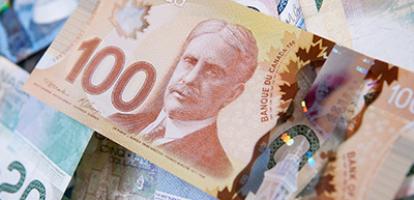From: Peter van Dijk and Glen Hodgson
To: Canadians concerned about the recovery
Date: July 7, 2020
Re: How to pay for the COVID-19-induced federal debt?
COVID-19 forced Canada to take the drastic measure of shutting down its economy, resulting in massive government spending to support individuals and businesses, and unprecedented fiscal deficits and a much higher and rising public debt burden.
While we strongly prefer to manage fiscal deficits and public debt through a combination of economic growth and carefully controlling government spending, we anticipate governments will be forced to increase their revenues by raising taxes.
Macroeconomics should drive these tax increases and not ideology, politics and populism. We should remember Jean-Baptiste Colbert’s adage that “the art of taxation consists in so plucking the goose as to obtain the largest amount of feathers with the smallest amount of hissing.”
To protect Canada’s recovering economy, we strongly suggest that any tax increases follow Colbert’s recipe: raising the largest amount of revenue with the smallest amount of economic damage.
So, what does this mean concretely? In a nutshell, Canada’s federal and provincial governments should be prepared to increase consumption taxes and add digital taxes, while marginally reducing personal and corporate income tax rates. Increasing consumption taxes and adding digital taxes will increase tax revenues – and marginally reducing personal and corporate income taxes will also likely increase personal and corporate income tax revenues.
Consumption taxes, such as the GST, HST and provincial sales taxes, are generally better for raising additional revenue while limiting the negative impact of taxes on economic activity. We recognize this has been a populist flashpoint, but appropriately designed, consumption taxes can be quite progressive. Therefore, increasing consumption taxes should be the main area for consideration when raising additional tax revenues.
Canada’s consumption tax rates are modest compared to other parts of the world, such as Europe, so we certainly have the room to increase our rates. Many Canadians benefitted from the extraordinary spending programs, and they should contribute to debt management through an increase in broad-based consumption taxes.
The OECD’s efforts to establish an international framework for digital taxation is on life support, so Canada should also start thinking about how to tax the digital economy. As a minimum, the federal and provincial governments should follow Quebec’s lead to subject e-commerce businesses located outside Quebec and selling digital services to Quebecers to QST. Not only does this generate revenue, but it would also level the playing field with conventional businesses.
From an economic perspective, personal and corporate income taxes are generally very inefficient ways of raising tax revenues. Although often considered attractive politically, further increases to personal and corporate income tax rates are to be avoided since they would stifle the recovery by adding to work and investment disincentives. Moreover, recent research focusing on provincial governments suggests that reducing the high marginal personal and corporate income tax rates in Canada could, in some instances, result in higher personal and corporate income tax revenues.
Some politicians market high progressive income tax rates as a tool to reduce income inequality in Canada. At best, high progressive income tax rates only deal with the symptoms of income inequality, not with the underlying root causes, such as access to education and healthcare.
As an alternative, reducing income inequality through the tax system without harming Canada’s economy could be achieved by gradually increasing the tax rate on income from capital and capital gains. Currently, capital-related income is taxed at significantly lower rates than labour-related income.
Recently, we have heard more calls for introducing a wealth tax in Canada to raise revenue and reign in income inequality. Before adding a wealth tax, we need to fully understand the impact of such a tax on our economy. Many countries – notably in Europe – have tried to introduce a wealth tax and have largely abandoned it. Their experience has been that wealth taxes never raised significant revenue, are difficult to administer and harm economic growth.
We should also consider redesigning the way we tax businesses. Instead of taxing businesses on an income basis, Canada should consider taxing businesses on a cash-flow basis or an economic rent basis. Cash-flow basis taxation allows for the immediate deduction of current expenses and investments in machinery and equipment. Economic rent – or excess profit – taxation would tax profits that exceed a specified average rate of return. This would significantly improve the competitiveness of Canada’s business tax regime and can lead to increased tax revenues.
Finally, governments worldwide are making significant efforts to ensure that the economic recovery is a “green economic recovery,” developing a low-carbon economy aligned with the Paris Agreement. Canada’s federal and provincial governments should collaborate and show leadership by significantly increasing our carbon emissions price on consumers and major emitters. Additional carbon tax revenues can be used to reduce fiscal deficits and public debt, to provide rebates, or to fund fiscal measures to encourage projects and investments that reduce greenhouse gas emissions.
We have listened to our public health experts in dealing with the medical aspects of COVID-19. We should now listen to economic and fiscal experts in ensuring that our economic recovery from COVID-19 will be successful and robust.
Peter van Dijk and Glen Hodgson are senior fellows at the C.D. Howe Institute.
To send a comment or leave feedback, email us at blog@cdhowe.org.
The views expressed here are those of the authors. The C.D. Howe Institute does not take corporate positions on policy matters.





